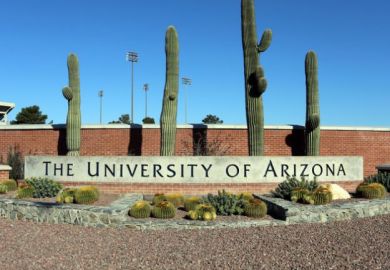Just as the University of Idaho reaches crunch time for its acquisition of the University of Phoenix, it is getting a major cautionary example from Arizona, where a similar purchase is producing mounting costs and political recriminations.
The University of Arizona began working to buy the for-profit Ashford University in 2020 and completed the deal last year. The initiative is now attracting criticism over falling enrolment, budgetary losses and past student loan liabilities, with the state’s governor among those demanding answers.
In an especially large potential hit, the Biden administration cancelled $72 million (£57 million) in federal student loan debt owed by more than 2,300 former students of Ashford – which long faced questions about the quality of its education and staffing, and its high student dropout rates – and then suggested the University of Arizona was liable for paying the amount.
The Ashford University operation – now renamed the University of Arizona Global Campus – is also losing money, estimated at $2.5 million in the current fiscal year, compounding budgetary troubles at the University of Arizona stemming from what its leadership described late last year as a surprise $240 million budget shortfall in its bank accounts.
The University of Arizona attributed that huge gap to unexpected spending on sports and student financial aid, and it took steps that included freezing faculty pay and hiring. That has now led the state’s Democratic governor, Katie Hobbs, to lash out, blaming a “failure of leadership” at the university and demanding answers – including an explanation of the assumptions and verifications upon which the Ashford purchase was based.
In response, the University of Arizona told the governor it was “clear-eyed in recognising the headwinds facing Ashford”. Yet it also argued that it was not responsible for the $72 million in federal student loan debt compiled by Ashford prior to the sale.
The situation has parallels with the University of Idaho, which has been working for most of the past year to buy the remnants of the University of Phoenix. Phoenix was once the nation’s largest online university but is now, like Ashford, among a series of for-profit giants brought down by policies of rapid growth fuelled by pursuits of federal student aid dollars.
In the case of Phoenix, the US Department of Education has suggested it owes the federal government nearly $37 million to cover loan support for more than 1,200 students who were deceived about the value of a Phoenix education. And as with the University of Arizona and Ashford, the University of Idaho isn’t being fully clear about its potential liability for that amount in the event it completes its purchase of Phoenix.
Phoenix, however, has suggested that it would aggressively fight in court any attempt to hold it responsible for student borrowing repayments by the government.
The Arizona and Idaho cases are among several attempted and actual purchases in the US in recent years built on the idea that the stripped-down remains of troubled for-profit operations can help public institutions grab a quick foothold in a fast-growing and lucrative market for online education.
But the two cases also demonstrate the danger of universities pursuing such deals, said Robert Shireman, a deputy undersecretary of education in the Obama administration now serving as a senior fellow at The Century Foundation, a progressive thinktank.
“In both cases, university leaders fell for sales pitches and then went along when the sellers insisted that they should keep everything quiet until it was a done deal,” Mr Shireman said. “The excessive secrecy made it impossible to adequately vet the deal.”
Register to continue
Why register?
- Registration is free and only takes a moment
- Once registered, you can read 3 articles a month
- Sign up for our newsletter
Subscribe
Or subscribe for unlimited access to:
- Unlimited access to news, views, insights & reviews
- Digital editions
- Digital access to THE’s university and college rankings analysis
Already registered or a current subscriber? Login








